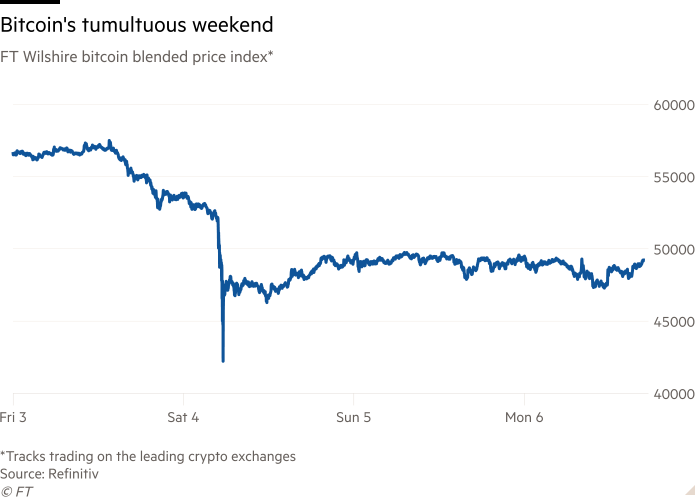Bitcoin’s weekend tumble hints at Wall Street traders’ growing sway

Roula Khalaf, Editor of the FT, selects her favourite stories in this weekly newsletter.
Bitcoin’s rocky weekend marked one of the first times a storm in traditional financial assets triggered big waves in cryptocurrencies, underscoring how large investors are playing an increasing role in digital asset markets.
The price of the biggest cryptocurrency by market value tumbled $10,000 in just 60 minutes in the early hours of the London morning on Saturday to hit $42,222, according to the FT Wilshire blended bitcoin price index that tracks trading on leading crypto exchanges.
The 20 per cent flash fall came just hours after the close of a volatile week on Wall Street, in which stocks and bonds moved sharply in response to potential shifts in monetary policy and the spread of the new strain of coronavirus.
Crypto’s weekend shock suggests this typically somewhat separate market is becoming more closely tied to those traditional assets, particularly now that big institutional investors are more involved.
“This started as a risk off move in traditional macro circles [which] triggered some liquidations in crypto,” said David Fauchier, a portfolio manager at digital asset specialist Nickel Digital, noting that investors who were selling equities also rushed to shed bitcoin which, unlike other markets, is tradable over weekends.

More than $2.5bn worth of bets went sour “in the first massive liquidation event since September,” said Joshua Lim, head of derivatives trading at Genesis Trading, who said selling pressure from professional investors led to the clear-out of bets on exchanges such as Binance.
On crypto futures exchanges, traders who have magnified their bets using borrowing are typically wiped out when the price of a digital token reaches a certain threshold, known as the liquidation price.
Lim added that the rapid drop also washed out over $5bn worth of positions in traditional futures markets where investors can bet on the price of cryptocurrencies, reducing the number of outstanding bets by almost a quarter.
Bitcoin prices have jumped more than 500 per cent in the past two years, with some investors — primarily amateur retail investors but also some professionals — drawn in by the theory that returns could be uncorrelated to other assets. But as more hedge funds and other big investors get involved, links with other markets tighten.
Many professional investors had also been keen to crystallise paper gains into real returns before the end of this year, which contributed to the sell-off, said Jan Stromme, founder of crypto trading company Alphaplate.
“I expect an increasing correlation between risk sentiment in traditional markets and [digital ones],” added Fauchier.
The resurgence of coronavirus, weak jobs data and comments from Federal Reserve chair Jay Powell hinting at an earlier than expected rise in interest rates jolted investors to rethink their bets and switch out of assets that thrive when global growth is strong.
“[Bitcoin’s sell-off gathered pace] as general market jitters escalated,” said Lim. That offers a reminder that while bitcoin is seen as one of the safer cryptocurrencies, compared with even more volatile bets such as dogecoin, it is still vulnerable in moments of market nerves.
Prices failed to fully recover by Tuesday, with bitcoin trading at $51,265.
Professional investors dipping a toe into crypto generally lack the almost religious belief in digital assets common among the hardcore fan base of retail investors who insist on holding on to digital coins come what may.
“We have to think that it is just another risky asset that will rally when the world is a good place and sell off when it is not,” said Beat Nussbaumer, a Swiss currency trader and portfolio manager. Early retail buyers of crypto had welcomed institutional investors into the market in the hope that they would fire up the price, but the weekend sell-off suggested it also introduced new vulnerabilities, he said.
Weekly newsletter
For the latest news and views on fintech from the FT’s network of correspondents around the world, sign up to our weekly newsletter #fintechFT
Comments